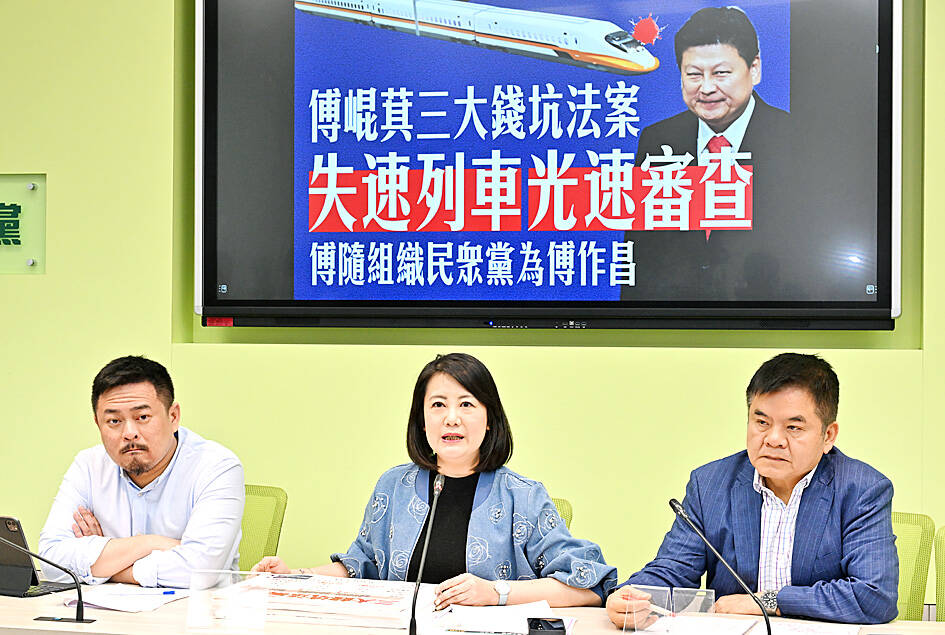The Democratic Progressive Party (DPP) caucus yesterday said it would ask the Executive Yuan to raise a motion to oppose the Chinese Nationalist Party (KMT) caucus’ infrastructure proposals and prepare to file for a constitutional interpretation if the KMT-dominated legislature forces their passage.
The DPP caucus described the three infrastructure plans for transportation links to eastern Taiwan proposed by the KMT as “three money pit projects” that would cost more than NT$2 trillion (US$61.72 billion).
It would ask the Executive Yuan to oppose public projects that would drain state financial resources, DPP caucus secretary-general Rosalia Wu (吳思瑤) said.

Photo: Tien Yu-hua, Taipei Times
It would also file for a constitutional interpretation if KMT lawmakers push the proposals through by making them special statute bills, she added.
The three bills propose constructing an expressway for Hualien and Taitung counties to link to the national highway system with an estimated budget of NT$250 billion; building a high-speed rail system in eastern Taiwan that would link to the national line at a cost of NT$1 trillion; and extending Freeway No. 6 (also known as the Central East West Freeway) for vehicle traffic between Taichung City and Puli (埔里), which would run through the Central Mountain Range and end in Hualien City at a cost of more than NT$800 billion.
DPP legislators oppose these “three money pit projects” as they lack input from transportation and engineering experts, disregard environmental impact assessments, are devoid of transparency and financial accountability, and had bypassed the deliberation process in the legislature, Wu said.

Photo: CNA
Moreover, the construction of these projects would pass through indigenous land, which requires the consent of indigenous communities as stipulated in the Indigenous Peoples Basic Act (原住民族基本法), DPP lawmakers said.
Building transportation links through the earthquake-active zones of the Hualien-Taitung Rift Valley (花東縱谷) and the east coast region also poses a geohazard, they said.
On the fiscal front, the proposed projects would contravene Article 70 of the Constitution, which stipulates: “The Legislative Yuan shall not make proposals for an increase in the expenditures in the budgetary bill presented by the Executive Yuan,” Wu said.
KMT caucus whip Fu Kun-chi (傅?萁), a former Hualien county commissioner, yesterday said he is fighting for public projects and improved transportation links to bring economic prosperity, enhance travel safety and improve the livelihoods of Hualien County residents.
Taiwan People’s Party caucus whip Huang Kuo-chang (黃國昌) said he supports the KMT’s proposals, but added that he has asked for additional clauses to ensure fiscal restraint so that the projects would not sink into debt or use the state’s special funds.

Intelligence agents have recorded 510,000 instances of “controversial information” being spread online by the Chinese Communist Party (CCP) so far this year, the National Security Bureau (NSB) said in a report yesterday, as it warned of artificial intelligence (AI) being employed to generate destabilizing misinformation. The bureau submitted a written report to the Legislative Yuan in preparation for National Security Bureau Director-General Tsai Ming-yen’s (蔡明彥) appearance before the Foreign Affairs and National Defense Committee today. The CCP has been using cognitive warfare to divide Taiwanese society by commenting on controversial issues such as Taiwan Semiconductor Manufacturing Co’s (TSMC, 台積電) investments in the

HELPING HAND: The steering committee of the National Stabilization Fund is expected to hold a meeting to discuss how and when to utilize the fund to help buffer the sell-off The TAIEX plunged 2,065.87 points, or 9.7 percent, to close at 19,232.35 yesterday, the highest single-day percentage loss on record, as investors braced for US President Donald Trump’s tariffs after an extended holiday weekend. Amid the pessimistic atmosphere, 945 listed companies led by large-cap stocks — including Taiwan Semiconductor Manufacturing Co (TSMC, 台積電), Hon Hai Precision Industry Co (鴻海精密) and Largan Precision Co (大立光) — fell by the daily maximum of 10 percent at the close, Taiwan Stock Exchange data showed. The number of listed companies ending limit-down set a new record, the exchange said. The TAIEX plunged by daily maxiumu in just

‘COMPREHENSIVE PLAN’: Lin Chia-lung said that the government was ready to talk about a variety of issues, including investment in and purchases from the US The National Stabilization Fund (NSF) yesterday announced that it would step in to staunch stock market losses for the ninth time in the nation’s history. An NSF board meeting, originally scheduled for Monday next week, was moved to yesterday after stocks plummeted in the wake of US President Donald Trump’s announcement of 32 percent tariffs on Taiwan on Wednesday last week. Board members voted to support the stock market with the NT$500 billion (US$15.15 billion) fund, with injections of funds to begin as soon as today. The NSF in 2000 injected NT$120 billion to stabilize stocks, the most ever. The lowest amount it

INVESTIGATION: The case is the latest instance of a DPP figure being implicated in an espionage network accused of allegedly leaking information to Chinese intelligence Democratic Progressive Party (DPP) member Ho Jen-chieh (何仁傑) was detained and held incommunicado yesterday on suspicion of spying for China during his tenure as assistant to then-minister of foreign affairs Joseph Wu (吳釗燮). The Taipei District Prosecutors’ Office said Ho was implicated during its investigation into alleged spying activities by former Presidential Office consultant Wu Shang-yu (吳尚雨). Prosecutors said there is reason to believe Ho breached the National Security Act (國家安全法) by leaking classified Ministry of Foreign Affairs information to Chinese intelligence. Following interrogation, prosecutors petitioned the Taipei District Court to detain Ho, citing concerns over potential collusion or tampering of evidence. The